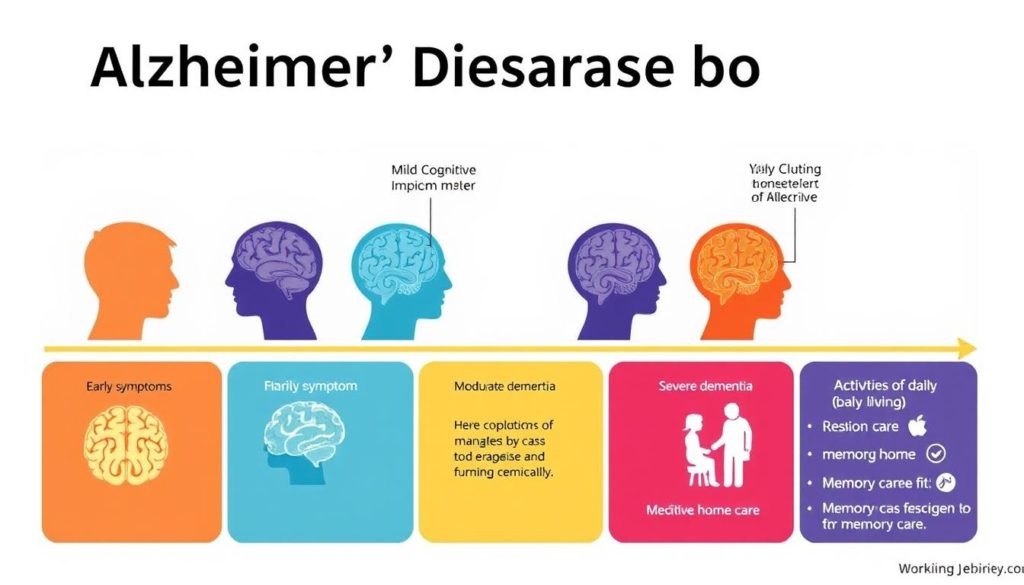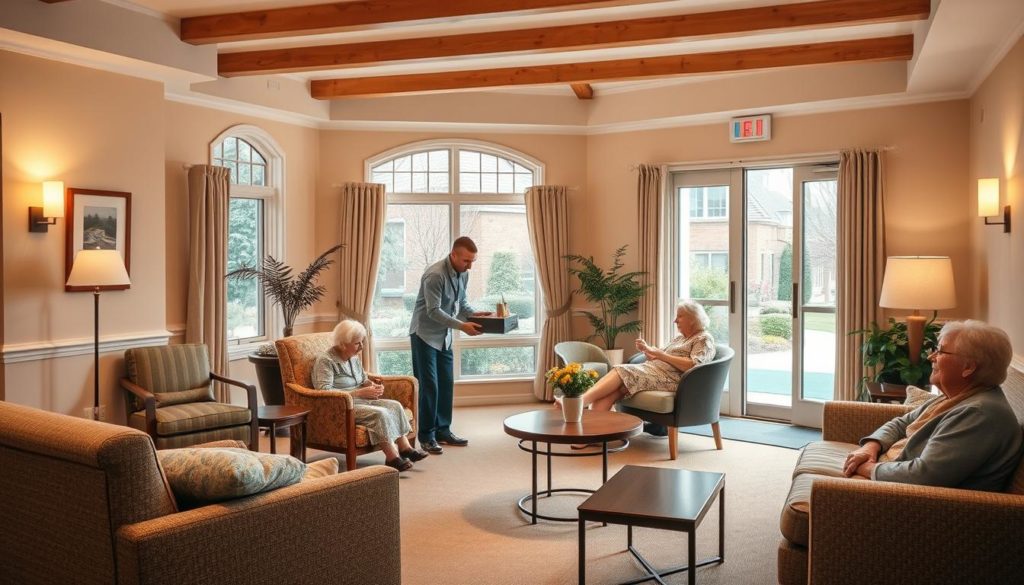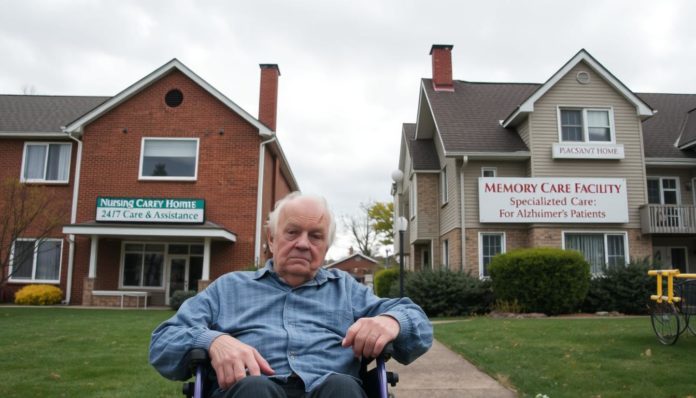Did you know that nearly 6 million Americans are living with Alzheimer’s disease? As the numbers continue to rise, choosing between Alzheimer’s care options becomes ever more crucial for families. When it comes to Alzheimer’s residential care, the decision between nursing homes and memory care facilities can profoundly impact the quality of life for a senior with memory loss.
Understanding the differences between senior care for memory loss options is key. Nursing homes provide wide-ranging medical and personal care. On the other hand, memory care facilities offer specialized, secure environments specifically for those with Alzheimer’s.
They focus on safety, personalized assistance, and specialized dementia activities. Although often more costly, nursing homes cater to broad medical needs but lack the specialized training found in memory care facilities. Knowing these distinctions helps you make a well-informed choice for your loved one’s Alzheimer’s care.
Understanding Alzheimer’s and Its Progression
Alzheimer’s disease deeply affects memory and cognitive functions. As it gets worse, everyday tasks become harder, showing the need for more care. This highlights the importance of having help and good management.

What is Alzheimer’s?
This disease gradually destroys brain cells. It leads to memory, thinking, and behavior problems. It’s tough not just for the person who’s sick but also for their family and caregivers. Learning about Alzheimer’s and getting help from dementia care centers is key.
Stages of Alzheimer’s
Alzheimer’s disease develops through three stages. Each stage has different symptoms and care needs. Knowing these stages lets caregivers prepare and adjust their care.
- Mild (Early-Stage): People might forget things easily and have trouble learning new stuff. But, they can still do daily tasks with a little help.
- Moderate (Middle-Stage): This stage brings worse symptoms. People lose more memory and have trouble with speaking and thinking. They need more help now.
- Severe (Late-Stage): Now, talking and understanding get very hard, and full-time care is needed. At this point, dementia care centers are often necessary for their safety and health.
Knowing about Alzheimer’s disease progression is vital for caregivers. It helps them make the right choices about care, like moving to a nursing home or dementia care centers, when needed.
Nursing Homes: An Overview
Nursing homes provide round-the-clock care for people with chronic health issues or disabilities. They focus on patients who need ongoing medical attention and help with everyday tasks. Their main aim is to keep residents safe, comfortable, and content.

Services Provided in Nursing Homes
Nursing homes offer many services to meet their residents’ various needs. Some key services are:
- Skilled nursing care: Professional medical staff are always there to give medications, manage chronic health conditions, and carry out treatments.
- Rehabilitative therapies: These include physical, occupational, and speech therapies to improve or maintain residents’ abilities.
- Personal care assistance: Staff assist with daily tasks like bathing, dressing, and eating.
- Recreational activities: There are programs to help residents stay engaged and active, promoting social, mental, and physical well-being.
Benefits of Nursing Homes for Alzheimer’s Patients
Nursing homes specialized for Alzheimer’s patients offer big benefits. These benefits include:
- Access to skilled professionals who are experts in handling Alzheimer’s disease.
- Full medical care for chronic conditions, ensuring comprehensive health management.
- A safe and consistent environment, essential for those with memory issues.
- Support services and activities designed to enhance Alzheimer’s patients’ lives.
Nursing homes play a crucial role for Alzheimer’s patients by providing medical and personal support. This fosters their overall well-being.
Memory Care Facilities Explained
Memory care facilities are special places for people with Alzheimer’s and other dementias. They focus on safety, reducing confusion, and feeling like home.
Key Features of Memory Care Facilities
These places offer a structured yet cozy living area. They have safety features like secured exits. This helps prevent residents from wandering off. They also use things like colors and memory boxes. This helps residents know their own space. Plus, there are common areas for social activities.
Specialized Dementia Care Activities
At the core of these facilities is specialized dementia care. They offer activities to help with cognitive functions and life quality. This includes sensory and reminiscence therapies. There are also programs to keep the mind sharp and fitness activities suited to each person.
In comparing Memory Care facilities, one can see the importance of their specialized care. Activities like sensory and reminiscence therapy are key. They ensure residents get medical, emotional, and mental support.
Nursing Home vs. Memory Care for Alzheimer’s
Choosing between nursing homes and memory care for someone with Alzheimer’s is important. You need to know how they differ in medical care and costs.
Comparing the Level of Medical Care
Nursing homes offer a lot of medical care, needed for long-term Alzheimer’s care. These places have licensed pros who give a lot of medical help. This is crucial as the disease gets worse.
Memory care places focus more on helping with daily things and special activities for dementia care. They help manage daily living needs better.
Cost Differences Between Nursing Homes and Memory Care
The cost between Nursing Homes and Memory Care varies a lot. Nursing homes cost more because of their medical services. But it’s good to compare closely.
Memory care might be cheaper but doesn’t have all the medical stuff nursing homes do. Think about what the Alzheimer’s patient really needs.
Personalized Care in Memory Care Communities
Memory care communities focus on personalized dementia care. They offer care that is full of understanding and kindness. They make care plans for each person that not just look at medical needs but also their likes and life story.
Staff are well-trained to handle dementia behaviors. This special care helps residents feel supported. It makes the place calm and interesting. Care is based on two main things:
- Tailored activities that improve life
- Regular checks and updates of care plans
Memory care places believe in person-centered care. They want everyone to feel important and known. This care makes everyday life better and boosts overall health.
The focus on individualized care plans allows the care to change as needed. As dementia grows, care gets more complex. This flexible and personal approach is key in great memory care places.
Safety Measures in Memory Care Facilities
Memory care facilities focus on keeping residents safe. They use built-in safety features and strict security rules. Making a safe place for dementia patients is key. This helps provide a secure and caring space for those with dementia.
Built-in Safety Features
Memory care places have safety features for dementia patients. These include:
- Locked and alarmed doors to stop unauthorized exits.
- Color-coded walls help with finding the way and lower confusion.
- Safe outdoor areas for safe wandering.
- Personalized memory boxes by rooms for helping residents know their rooms.
These features help keep a safe memory care setting. They play a big role in looking after dementia patients.
Security Protocols to Prevent Wandering
Stopping wandering is a key safety part in memory care facilities. They have many security steps for this. These steps are:
- 24/7 staff monitoring to quickly fix safety issues.
- Door alarm systems that tell staff if a door opens unexpectedly.
- Frequent safety drills so staff is always ready.
These steps ensure a well-organized and safe memory care place. This gives comfort to both the people living there and their families. To find out more about how nursing homes and memory care spots differ, visit here.
Keeping dementia patients safe with these features and rules is key. It supports a caring and safe setting.
Staff Training and Expertise in Nursing Homes
Nursing homes are crucial for the care of dementia patients. They rely on staff training in dementia care and vast medical knowledge. This combination ensures top-notch care.
Medical and Non-Medical Staff
Nursing homes have a professional care team with doctors and helpers. Doctors handle medical needs like giving medicine and treating wounds. Helpers take care of daily tasks and offer comfort, meeting all residents’ needs.
Specialized Training for Dementia Care
Good care for dementia patients means having special training. This training gives caregivers skills for cognitive challenges. It involves ongoing education and hands-on training, so teams can address dementia’s difficult behaviors and psychological symptoms with kindness and skill.
| Aspect | Nursing Homes | Memory Care Communities |
|---|---|---|
| Type of Care | Skilled Nursing, Medical Services | Specialized Memory Care |
| Staff Training | Medical Expertise in Nursing Homes, Dementia-Specific Training | Focus on Alzheimer’s and Dementia |
| Professional Care Team | Registered Nurses, Therapists, Non-Medical Staff | Specialized Dementia Caregivers |
In short, nursing homes with a well-trained staff in dementia care and wide medical knowledge are preferred for comprehensive and specialized care.
Choosing the Right Care Option for Your Loved One
Finding the best Alzheimer’s care can be tough. You need to know the person’s health and daily needs well.
Assessing Medical Needs
Looking at care options means checking health needs closely. You must see how bad the disease is and what medical care is needed. Talking to doctors helps you find the right care for your family member.
Evaluating Daily Living Assistance
Support for daily tasks is key in deciding. Figure out how much help is needed with things like bathing and eating. Look at what nursing homes and memory care places offer. This helps you find a good place for your loved one to live safely and happily.
Cost of Memory Care vs. Nursing Homes
Deciding on the right care for people with Alzheimer’s involves looking at costs. Memory care is often less expensive than nursing homes. This is because memory care doesn’t need as much medical attention. Instead, it focuses on creating a secure, supportive place for those with dementia.
The cost of memory care can change based on several things. These include where it is located, the types of services offered, and if you pick a private or shared room. Places in cities or with many amenities usually cost more. Families should think about their money and all costs for both memory care and nursing homes.
Families need to look at ways to pay for Alzheimer’s care. Long-term care insurance can help cover costs. They should also look into government aid, benefits for veterans, and using personal savings. This helps families manage costs and find the best care option for their loved ones.
FAQ
What is Alzheimer’s?
Alzheimer’s is a brain disorder that slowly destroys memory and thinking skills. Over time, it affects a person’s ability to do simple tasks. It goes through stages, from mild forgetfulness to advanced dementia.
What are the stages of Alzheimer’s?
The disease starts with mild memory loss and can lead to the loss of talking and walking. As it gets worse, full-time care may be needed. Each stage needs different types of care.
What services are provided in nursing homes?
Nursing homes offer round-the-clock care for those who can’t live alone because of health problems. They have nurses, therapy, and help with daily life. It’s a place where people with serious health issues can live and get care.
What are the benefits of nursing homes for Alzheimer’s patients?
Nursing homes give Alzheimer’s patients access to medical care and skilled workers. They can handle complex health issues and medicines. This setting helps manage their unique health needs well.
What are the key features of memory care facilities?
Memory care places are designed for people with dementia. They are safe and look like home to help lower confusion. These facilities help people feel comfortable and stay safe.
What types of specialized dementia care activities are offered in memory care facilities?
These places have activities to keep the mind active. This includes sensory therapy and fitness aimed at memory loss. Activities are chosen based on what each person enjoys and can do.
How do nursing homes and memory care facilities compare in terms of the level of medical care?
Nursing homes provide more medical care than memory care places. They have licensed doctors and nurses for serious health needs. Memory care focuses more on day-to-day help rather than medical treatments.
What are the cost differences between nursing homes and memory care facilities?
Nursing homes cost more because they offer more medical care. Memory care is cheaper as it involves less medical care. This makes nursing homes a higher cost option compared to memory care.
What does personalized care in memory care communities involve?
Memory care is all about caring for each person as an individual. The staff learns what each resident needs and likes. This way, they can give care that feels personal and right for each person.
What built-in safety features can be found in memory care facilities?
To keep residents safe, these facilities have secure doors, clear signs, safe outdoor areas, and ways to help residents recognize their own rooms. Safety features help prevent wandering and confusion.
How do memory care facilities prevent wandering?
They use alarms on doors, have safe outdoor places, and keep a close watch on all residents. This keeps people with dementia safe and within a secure place.
What type of staff is employed in nursing homes?
They have a mix of medical and support staff. This includes nurses and other specialists. They work together to give care for all of the residents’ needs.
How are staff members in nursing homes trained to care for dementia patients?
Staff get special training for dementia care. They learn how to meet the needs and handle the behaviors of those with memory issues. This helps them give better care.
What factors should be considered when choosing the right care option for a loved one with Alzheimer’s?
Think about how much care they need with daily life and health. Talk to doctors, look into local care places, and think about costs. Choosing care is about finding the best place for your loved one’s needs.
How do costs for memory care facilities compare to nursing homes?
Memory care is usually cheaper than nursing homes. The difference in price is because of the level of medical care. Families need to look at their money situation and check insurance options to help pay for care.


